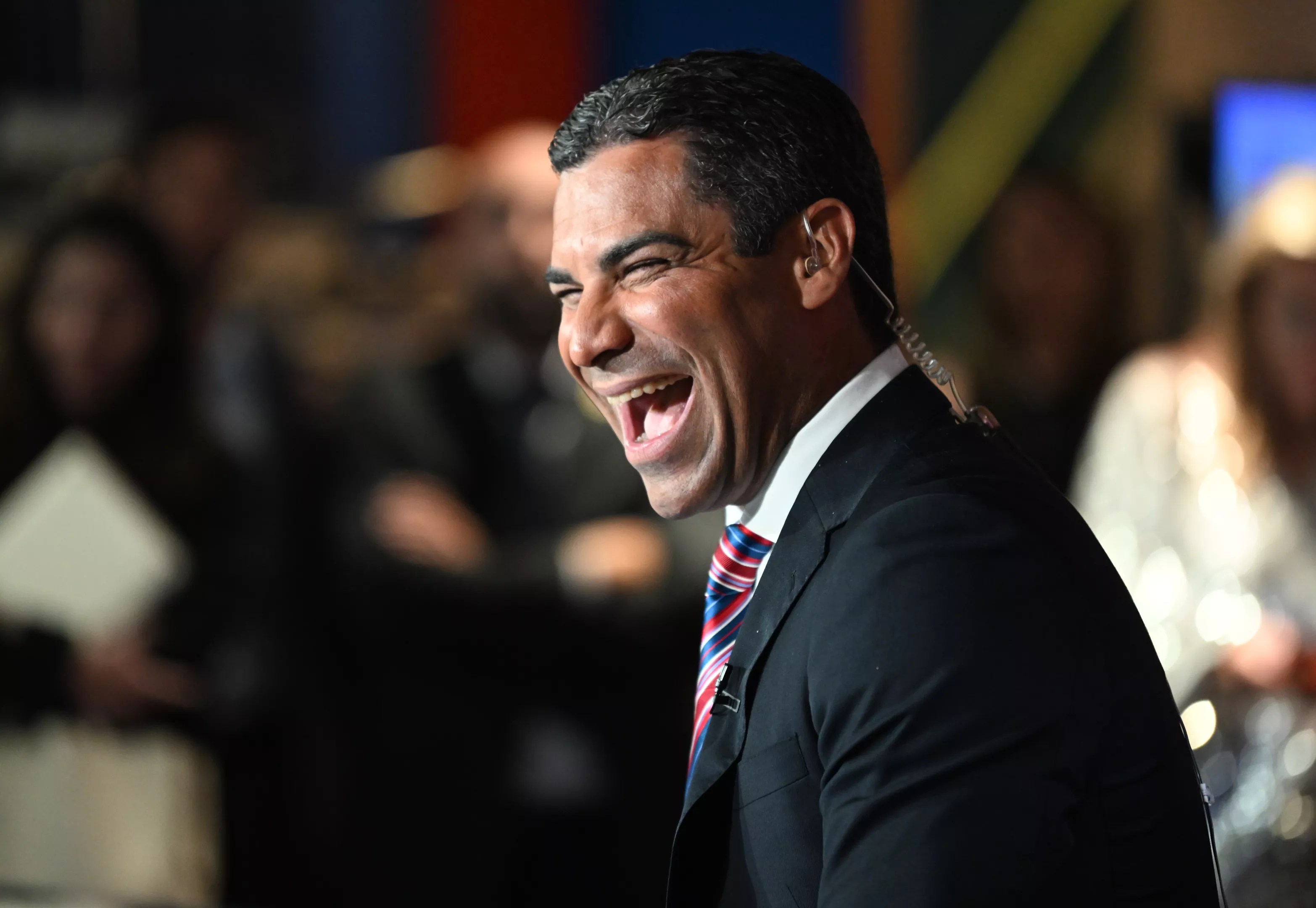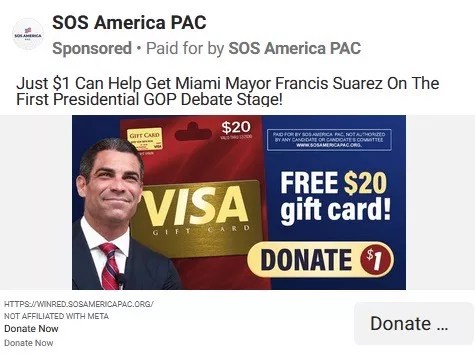
Photo by Jason Koerner/Getty Images

Audio By Carbonatix
Miami mayor and 2024 presidential long-shot Francis Suarez triumphantly revealed this week that he had lined up the 40,000 donors required to earn a spot on the Republican presidential debate stage. He still needs to meet the polling requirement to qualify, but with eternal optimism and the SOS America super PAC at his back, Suarez is one step closer to standing shoulder-to-shoulder with Donald Trump and Florida Gov. Ron DeSantis at the August 23 debate.
How did Miami’s honcho clear the donation obstacle despite polling around 0.2 percent nationally?
Well, thanks to some unusual fundraising tactics – driven largely by luring donors with various goodies – Suarez was able slide past the threshold, notwithstanding his campaign trail gaffes. (Remember the “weebles”?)
After raffling off front-row seats to Lionel Messi’s Inter Miami CF debut in late July, the presidential hopeful resorted to more direct means of enticement. Following in the footsteps of North Dakota Gov. Doug Burgum, a wealthy ex-Microsoft executive and fellow presidential candidate, Suarez promised $20 Visa gift cards to each donor who contributes at least $1 to his page on WinRed, the GOP’s fundraising platform.
“Everything costs more in Joe Biden’s America so, to help you out, Miami Mayor Francis Suarez is offering you a free $20 Visa gift card when you donate just one dollar to his campaign,” the promotion reads.
The gift-card enticement method has been untested before the Federal Elections Commission, but it raises questions how the resulting donations should be categorized given that campaigns could be construed as recycling their own money by paying for contributions. In Suarez’s campaign, for example, a $1 donor receives $19 net in return.
Some experts have voiced concerns about whether the tactic jibes with federal election law that prohibits a political donor from making contributions “in the name of another person,” AKA a straw donor. Campaign finance lawyer Paul S. Ryan told The Atlantic it would set a “horrible precedent” if politicians are allowed to offer gift cards in exchange for donations.
Burgum and Suarez’s promotions have been criticized for circumventing the spirit of the Republican National Committee debate qualifications, which encourage widespread grassroots support. To qualify for the August 23 debate, the committee requires 40,000 unique donors, with blocks of at least 200 donors each spread across 20 states or U.S. territories.
Suarez’s promotion was heavily advertised on social media by SOS America, the political action committee supporting Suarez’s campaign. A promotional link, which is now dead, included SOS America PAC in the web address. Suarez also promoted the giveaway on his Twitter account.
When contacted by New Times, PAC spokesperson Chapin Fay said the super PAC has “nothing to do” with the gift card fulfillment.
“The gift card promotion was done by the official campaign,” Fay said.
SOS America previously ran a contest to win a year of college tuition, up to $15,000, in exchange for a $1 donation.

Screenshot via Facebook provided to New Times.
Under federal law, super PACs cannot donate directly to candidates or coordinate with them or their campaigns. Federal elections attorney Kenneth Gross tells New Times, however, that it’s hard to prove coordinated communications between a candidate and their super PAC, especially in a timely fashion.
While candidates are prohibited from paying people for their votes, there is no law that explicitly bars a candidate from compensating them in exchange for a donation, he says.
“It was a unique scheme when the governor of North Dakota did the same thing with success,” Gross adds. “It will be interesting to see how this all plays out.”
The timetable for when the Suarez campaign will be sending the gift cards is unclear. New Times has not received a response to questions submitted to the campaign regarding the fulfillment process.
Meanwhile, some folks are claiming they donated to Suarez but have yet to receive their gift cards. And they appear to be getting antsy.
Still waiting for my gift card.
— MAT (@Mookie1969) August 8, 2023
One man tells New Times he donated on July 31 and has not received his gift card despite his account being charged. He adds that he hasn’t received any confirmation that the card is processing or when it will arrive. He says he also donated to the Burgum campaign and received the gift card from that promotion ten days later.
“All I get is more emails saying I should donate to receive my card, but I guess I’ll wait and see,” he says of the Suarez donation.
John Penley, a Las Vegas resident, says he donated to the campaign on August 4 and contacted WinRed to find out when he would receive the card. The donor support service told him the fundraising platform was not running the promotion and he needs to reach out directly to the Suarez campaign. Penley tells New Times he hasn’t heard anything about the fulfillment process since he donated.
Given the novel nature of gift-card promotions to lure donors, super PACs associated with candidates using the strategy are likely to distance themselves from the card purchasing process. A super PAC’s involvement in the buying process would run the risk of being classified as a direct campaign contribution, which could violate federal law.
FiveThirtyEight’s poll of polls shows that Trump leads the Republican field of presidential candidates by a wide margin. More than 53 percent of surveyed voters favored Trump, followed by DeSantis (14.3 percent), then biotech financier Vivek Ramaswamy (7.5 percent).
Since he announced his bid for the White House in June, Suarez’s campaign has banked on portraying him as the Republican candidate most likely to court young voters and Latinos. During recent media interviews, he has touted his record as mayor, saying that he’ll be able to translate his experience ushering financial growth in Miami to leadership on the national economy.
“I want to take that same prosperity, that same austerity, and I want to take it national to balance our budget and create prosperity for the American people,” Suarez told Brett Baier on Fox News August 7.
The August 23 debate is slated to take place at the Fiserv Forum in Milwaukee, Wisconsin, with Fox News’ Martha MacCallum and Baier as moderators.
In addition to the donor requirements to qualify for the debate, candidates must poll at least one percent in three national polls, or one percent in two national polls and one percent in an early state poll from two separate “carve out” states (Iowa, New Hampshire, Nevada, South Carolina).